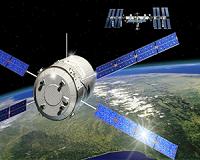 |
Washington DC (SPX) Feb 07, 2011 The International Space Station partner agencies met Thursday, Feb. 3, by videoconference to discuss coordinating the increased use of the space station as a research laboratory. The agencies want to continue using the station as a test-bed for exploration and find innovative ways to reduce costs while increasing use. The Multilateral Coordination Board (MCB) meeting included senior representatives from NASA; the Canadian Space Agency (CSA); the European Space Agency (ESA); the Russian Federal Space Agency (Roscosmos); and the Japanese Ministry of Education, Culture, Sports, Science and Technology (MEXT). As the senior management board, the MCB meets periodically to ensure coordination of station operations and activities among the partners. The MCB reaffirmed its commitment to reduce operational costs, develop an integrated transportation plan and maximize return by increasing research aboard the station while developing techniques for future exploration outside Earth's orbit. The MCB members reviewed ongoing international use of the station as a laboratory for scientific research, technology development and testing and educational activities. In the six months between March and September 2010, the five partner agencies have provided 195 research opportunities on the orbiting outpost for 385 investigators from 29 countries. Increasing the station's use as a unique laboratory is of paramount importance to the international partners. The International Space Station has proven to be an important platform for research in biology and biotechnology, Earth and space science, human physiology, physical science, technology development and education. The partners also renewed their commitment to use station resources and observation capability to assist in humanitarian needs such as aiding in disaster recovery, tracking oil spills and monitoring climate change. All of the partners also recognize the station's role in inspiring students around the world to learn about science, technology, engineering and mathematics. More than 30 million students have participated in human spaceflight through communications downlinks and interactive experiments with station astronauts. The governments of Japan and the Russian Federation have approved continued ISS operations beyond 2016. The NASA Authorization Act of 2010 extended operations until at least 2020. ESA and CSA are working with their respective governments to reach consensus about the continuation of the station.
Share This Article With Planet Earth
Related Links MEXT Roscosmos ESA CSA NASA Station at NASA Station and More at Roscosmos S.P. Korolev RSC Energia Watch NASA TV via Space.TV Space Station News at Space-Travel.Com
 Europe's ATV Space Ferry Ready For Launch
Europe's ATV Space Ferry Ready For LaunchParis, France (ESA) Feb 04, 2011 ESA's latest Automated Transfer Vehicle is ready for launch to the International Space Station on Tuesday, 15 February at 22:08 GMT from Europe's Spaceport in Kourou, French Guiana. The unmanned spaceship will deliver essential supplies and reboost the Station during its mission lasting three and half months. The launch will be covered live from Kourou for broadcasters and on the Web, and ... read more |
|
| The content herein, unless otherwise known to be public domain, are Copyright 1995-2010 - SpaceDaily. AFP and UPI Wire Stories are copyright Agence France-Presse and United Press International. ESA Portal Reports are copyright European Space Agency. All NASA sourced material is public domain. Additional copyrights may apply in whole or part to other bona fide parties. Advertising does not imply endorsement,agreement or approval of any opinions, statements or information provided by SpaceDaily on any Web page published or hosted by SpaceDaily. Privacy Statement |